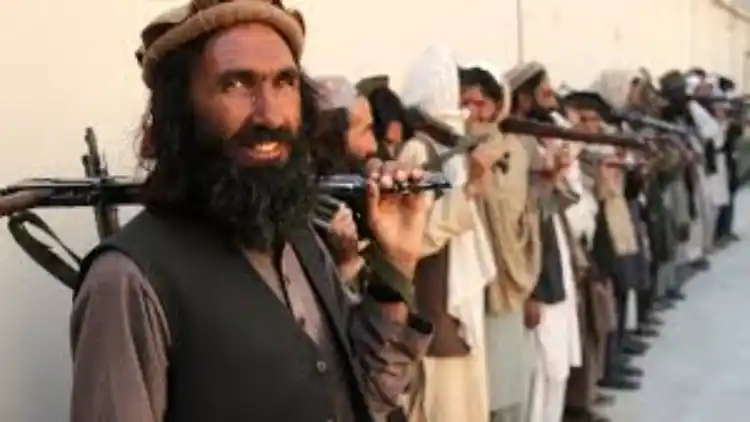Shantanu Mukharji
So many fast developments are taking place around Afghanistan that it’s impossible to keep pace. By the time this piece is being finalised, more interesting developments must have taken place. Either way, preliminary analysis in the immediate aftermath of the Taliban occupying Kabul seems imperative. First and foremost, the ‘might’ of the superpower, the USA, is shockingly exposed. The way the US troops engaged on the Afghan soil for nearly two decades left has been the most disappointing belying trust of the allies the world over. The poorly equipped Afghan troops were left in the lurch to fend for themselves in their worst crisis.
Such betrayal apart, the US intelligence machinery, particularly the CIA stands exposed. Their capacity to draw up a proper contingency plan for an honourable exit was never in place though the US was crying hoarse that it would withdraw troops before 31 August. It may be Germane to mention Sir Alexander Burnes, the Scotsman, diplomat turned spy who cultivated as early as 1839 his natives to spy and report to the British Empire about the activities in Afghanistan. Before his assassination in 1841, he had managed to raise several sources using the traditional statecraft of human intelligence. If he could do it why couldn’t a gigantic and affluent CIA do it with its technological and electronic intelligence prowess two centuries later? The US administration may hold its intelligence arm to account for this lapse or else, one wouldn’t have seen the chaotic scene that the US left behind after the Taliban assumed power. The Biden led leadership and more specifically, the Pentagon and the CIA have to answer that.
The cakewalk that the Taliban had in annexing Afghanistan and Pakistan is the first country to have started distancing itself from the US, a global trend has already started.
Pakistan, probably under China’s influence, is vocal in anti-US and brazenly pro-Taliban in its rhetoric. Other than its steadily increasing proximity to China, Russia and Iran, the US has lost a longtime ally in Pakistan as the trust deficit, after the Taliban’s ascendancy, is now complete. With China’s open support to Taliban and its intent to recognize once it forms the government in Afghanistan. China is set to reinforce its ties with Iran and Russia vis a vis Taliban ruled Afghanistan.
Pakistan was all along wary about Ashraf Ghani’s Presidentship due to his trust in India. Since his disgraceful exit from the scene, Pakistan has heaved a sigh of relief. It’s also trying to reach out to Afghan friends of India to wean them away. This is evident in the recent meeting between erstwhile Northern Alliance leaders, brothers of Ahmad Shah Massoud, who were once sworn enemies of Pakistan and have changed their position. This was clear as they were seen in Islamabad with Pakistan’s foreign minister Shah Mahmood Qureshi a day after the Taliban takeover of Kabul.
Perhaps India has to recalibrate its Afghan policy to remain relevant to the Taliban’s scheme of things. Under no circumstances, Pakistan should gain the upper hand to woo India’s proven Afghan friends and any such move needs to be neutralized.
As things unfold, Pakistan has started moving several extra miles to warm up to the new Taliban regime. Prime Minister Imran Khan at a very recent function, endorsed Taliban policies by saying it has unchained shackles from slavery from foreign rule. This statement was unbecoming of an Oxford-educated, cricketer turned politician. A calculated restraint is certainly called for as caving into the Taliban mindset means Imran Khan and his country are, by implication supporting religious extremism and a regressive social and political rule.
In India, there are apprehensions that the Taliban might now focus on Kashmir and other targets in India. This looks a little far-fetched assessment at least for now. No doubt, ISIS, Al Qaeda activists have been freed by the Taliban and the foreign elements must be pressurizing the Taliban leadership to take on Indian targets but they are aware of the Indian alertness. This said the real peril lies in the role of Pakistan that will now try its best to use the Taliban to wage a proxy war in India.
In South Asia, Bangladesh has seen a large number of fundamentalist and extremist groups exhibiting extraordinary interest in the rise of the Taliban. Many are thought to be trying to go to Afghanistan to firm up their ties in furtherance of their terror agenda. Here too, Indo-Bangladesh Joint Counter Terror measures would help thwart such plans before it’s too late. It, however, goes without saying that the situation is combustible in India, Bangladesh, Indonesia, Maldives, Malaysia where the Afghan developments could lead to fresh waves of religious radicalization. The effects are already seen in Pakistan as a militant vandalized the statute of Sikh ruler Maharaja Ranjit Sing in Lahore. The supporters of the Taliban in Pakistan have scant respect for their elected government and they may have a field day in running amok.
(Writer is a retired IPS officer, a security analyst and a former National Security Advisor to the Prime Minister of Mauritius. Views are personal)

